In today’s world, education becomes a necessary asset for every child. Now-a-days, parents are keen on educating the child right from the beginning. There is a reason for that. A proper foundation in your child’s career will last forever. If the foundation collapses, everything will fall apart—the child’s education, vision, clarity, everything. Hence, Early Childhood Education (ECE) should be unavoidable, and the students with ECE certification will work for the child’s future. Therefore, for a reference to international students about ECE UK courses, this blog covers early childhood education in UK and other requisites such as ECE courses, the top UK universities for ECE, the way of applying, and concludes with some FAQs.
Table of Content
1What is Early Childhood Education2Difference between ECE and ECCE3Types of Early Childhood Education4Early Childhood Education Courses in UK for International Students5Best Universities in UK for Early Childhood Education6Early Childhood Education in UK Requirements7Early Childhood Education in UK Fees8How to Apply for Early Childhood Education in UK9Scholarships in UK for International Students10Early Childhood Education Jobs in UK11Conclusion12Frequently Asked Questions ( FAQ )
What is Early Childhood Education
- In simple terms, Early Childhood Education encompasses both formal and informal education for children aged from birth until 8 years.
- This early UK education focuses on several aspects, starting from critical developmental milestones, skills, and concepts to numeracy and literacy.
- During this period, the child’s brain is highly sensitive and understands everything, like a water-absorbing sponge.
- The purpose of this ECE is to develop the emotional, social and cognitive skills that are required for students to become a lifelong learner.
- This education is fundamental, not only to children in the United Kingdom but also to every child in the world since it shapes the later life of an individual.
Difference between ECE and ECCE
In the UK Education system, both Early Childhood Education (ECE) and Early Childhood Care and Education (ECCE) seemed to be related, but they are two distinctive topics, which were tabulated below:
| S.No | Early Childhood Education (ECE) | Early Childhood Care and Education (ECCE) |
| 1 | The aim is to prepare the children for formal schooling and to develop their skills via educational activities | The aim is to provide a supportive and safe environment to the children with the focus towards overall development. |
| 2 | ECE focuses primarily on educational aspects of the child. | ECCE focuses both on educational and caring aspects of the child. |
| 3 | ECE courses emphasize structural learning, curriculum development and pedagogical practices. | ECCE courses addresses the holistic development of children, including physical, emotional and social well-being. |
On the whole, ECE focuses the educational side whereas ECCE integrates education with care.
Types of Early Childhood Education
To enrol in early childhood education in UK, an international student must know its categories. These categories are vital to a student for enrolment, and the categories are as follows:
1. Early Years Foundation Stage: This category sets the standard for schools, nurseries, and other institutions about learning, development, and care for children aged between birth and 5 years.
2. Early Years Education: This type, focus the students, aged between 2 and 4 years, learn through play, creative activities, music, and dance.
3. Early Childhood Development and Learning Courses: This category focuses on children aged between birth and 8 years, aiming to promote their development.
4. Early Years and Education Courses: This type of courses focus on the education sector, child development, play safeguarding and equality.
5. Extended Master’s Courses: This one is a preparatory course before masters, and the reason is to get familiarized with concepts for international students.
Early Childhood Education Courses in UK for International Students
In the UK, there are various educational courses for international students, and some of the popular courses are as follows, credential-wise:
Diploma-Level
-
- There is a diploma course named “Diploma in Early Childhood Education” which typically an intermediate level of education.
- Diploma in Early Childhood Education in UK focuses on practical skills and knowledge needed for working with young children.
Bachelor-Level
-
- BA (Hons) Early Childhood Studies: It covers child development, policy, and practice. It is considered the best higher education in the UK for the early childhood domain.
- BA (Hons) Education (Entry-Level): This course emphasizes the education theory and practice for young children. Most of the international students prefer this course for childhood education to study in the UK.
Master-Level
-
- MA Early Childhood Education: This masters in early education in UK explores advanced topics in pedagogy, policy, and leadership.
- MA Education (Early Years): This course focuses on research and practice in early childhood education settings and welcomes the student who decides to study abroad.
Apart from these three, there are other levels of credentials, such as postgraduate certifications, foundation degrees, and online degrees, for students who want to pursue early childhood education in UK.
Best Universities in UK for Early Childhood Education
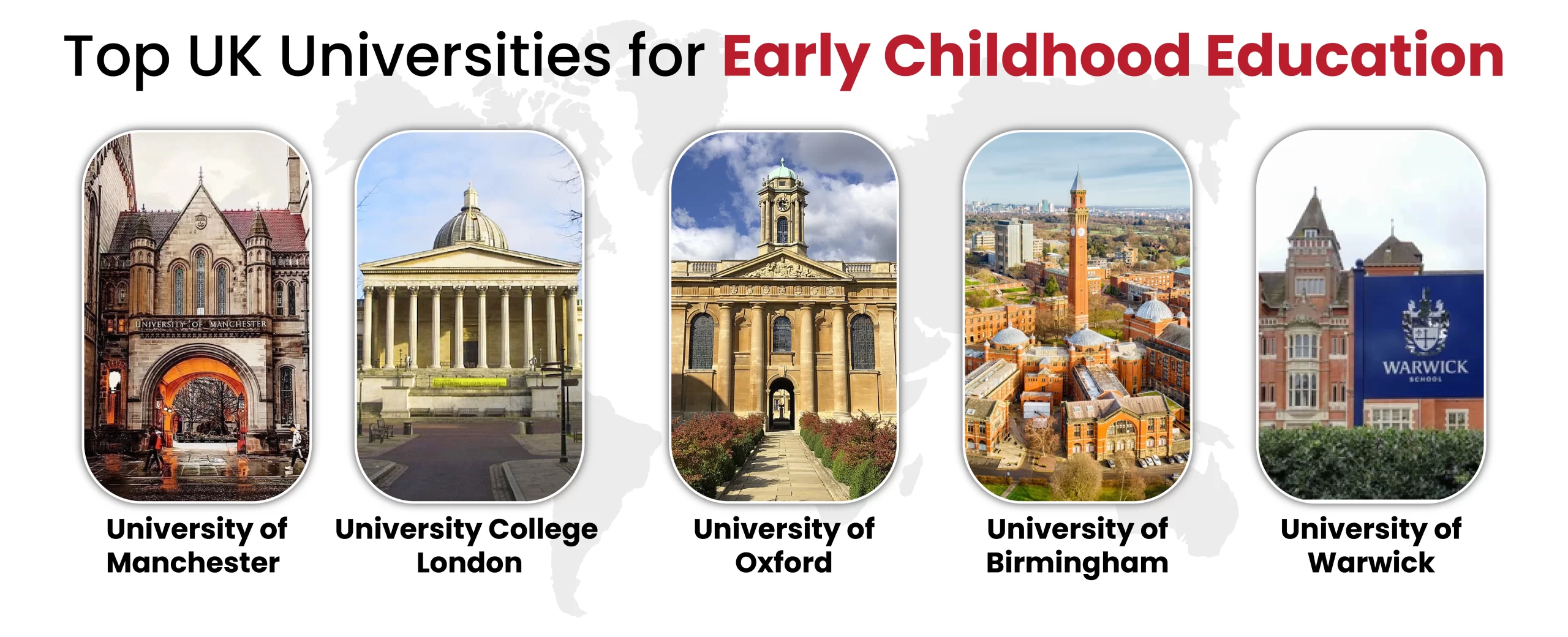
There are top universities that provide the ECE courses for students in UK as well as international students. Following are the best universities for Early Childhood Education:
- University of Manchester
- University College London
- University of Oxford
- University of Birmingham
- University of Warwick
Let’s look more about these colleges:
University of Manchester
The University of Manchester is one of the leading public universities in the UK that offers a range of programs. The vibrant campus, modern facilities, and a diverse student body foster innovation and a supportive environment for academic and personal development.
University College London (UCL)
UCL is a leading research university that offers a range of programs and emphasizes interdisciplinary leadership and innovation. The UCL is known for its academic excellence; the college provides students with access to a vibrant environment and numerous cultural opportunities.
University of Oxford
As per QS World Rankings (2025), the University of Oxford ranked 3rd in the world. The university is one of the oldest and most prestigious universities in the world. An international student with a valid United Kingdom student visa can enrol in the University of Oxford because of its rigorous academic programs and research excellence.
University of Birmingham
The University of Birmingham is a prominent institute in the UK recognized for its commitment to teaching and innovation. The university pulls the international students via its collaborative learning. There is also another reason—its strategic location. Because of all the positive factors, the student with a UK student visa becomes a part of Birmingham University.
University of Warwick
The University of Warwick is a highly regarded university known for its strong academic programs. The university also provides early childhood education in UK for international students and emphasizes collaboration and critical thinking.
If you want to dive to the UK for education, consider consulting some of the best UK education consultants like CanApprove.
Early Childhood Education in UK Requirements
Eligibility Criteria
There are certain eligibility criteria for an international student to be met, which are as follows:
- Education: Completion of higher secondary or equivalent education
- Language Requirements: There is certain language criteria listed for students which are listed below:
- IELTS: 6.0-7.5
- TOEFL: 80-110 overall
- PTE: 51-76
- UK Study Visa: A student with a valid study visa for UK.
Documents Required
After meeting the eligibility criteria, it is time for students to collect the necessary documents for enrolment which are:
- Marksheets of Secondary Education (or) Bachelors (or) Equivalent
- English Language Proficiency Test Scores
- Statement of Purpose
- Resume (or) CV
- Proof of finance
- Application Form & the Application Fee Receipt
- Letter of Recommendation (if required)
- United Kingdom Study Visa
Even though the documents mentioned above cover the most, it is advisable for students to check the course description before applying.
Early Childhood Education in UK Fees
Generally, the fee for early childhood education in UK varies according to the location, credential type, and so on. But, for students to be informed, the following table infers both the UK study cost and the student living cost in UK:
| Academic Fee (GBP/year) | Cost of Living (GBP/year) |
|
|
How to Apply for Early Childhood Education in UK
There are steps for an international student to enroll under Early Childhood Education. Those steps are as follows:
Step-1: Finalize a degree and the university via proper research and development.
Step-2: Go to the official website and check for the course description. The course description says the requirements and other particulars
Step-3: Collect the necessary documents as mentioned in the course description. Make sure that these documents have been scanned for uploading.
Step-4: After collecting the documents, go to the UCAS website (for undergraduate) or directly to the official chosen university (for postgraduate). Fill the details and attach the necessary documents and pay the application fee before signing out.
Step-5: Once the committee shortlists the application, it’s time for the next step. In some cases, they will call the applicant in for an interview. If not, the applicant skips this step.
Step-6: After receiving the confirmation, it is time for visa processing and other formalities. For visa-related queries and process, consider CanApprove.
Scholarships in UK for International Students
The student who crosses borders for education may face the vital issue – Finance. This factor stops most of the students from overseas education. Henceforth, students will receive the UK scholarship to alleviate the financial burden, with the following notable scholarships listed below:
Govt-Scholarships
-
- British Chevening Scholarship
- Commonwealth Scholarships
- Marshall Scholarships
Non-Govt Scholarships
-
- CastleSmart Scholarship
- The Royal Society Grants
- Saltire Scholarship
University-Based Scholarships
-
- National Overseas Scholarship Scheme
- Felix Scholarships
- University of Birmingham International Scholarships
Early Childhood Education Jobs in UK
Once a student completes the course, the student has a plethora of job opportunities to educate the children. These kinds of jobs involve not only educating the children en masse but also setting the foundation for them in later years. Following is the list of potential jobs after graduation:
- Early Years Teacher
- Education Consultant
- Education Mental Health Practitioner
- Family Support Worker
- Learning Mentor
- Play Therapist
- Primary School Teacher
- Special Education Needs Co-ordinator (SENCO)
- Education Psychologist
Conclusion
In a nutshell, pursuing Early Childhood Education in UK isn’t just about taking a class; it’s about taking on an important responsibility. Educating the children is like a front-line warrior, preventing the future from becoming inevitable. Hence, this education in the UK is in demand in present and in upcoming days, as well. If you want to jump to the UK in no time, consider CanApprove.


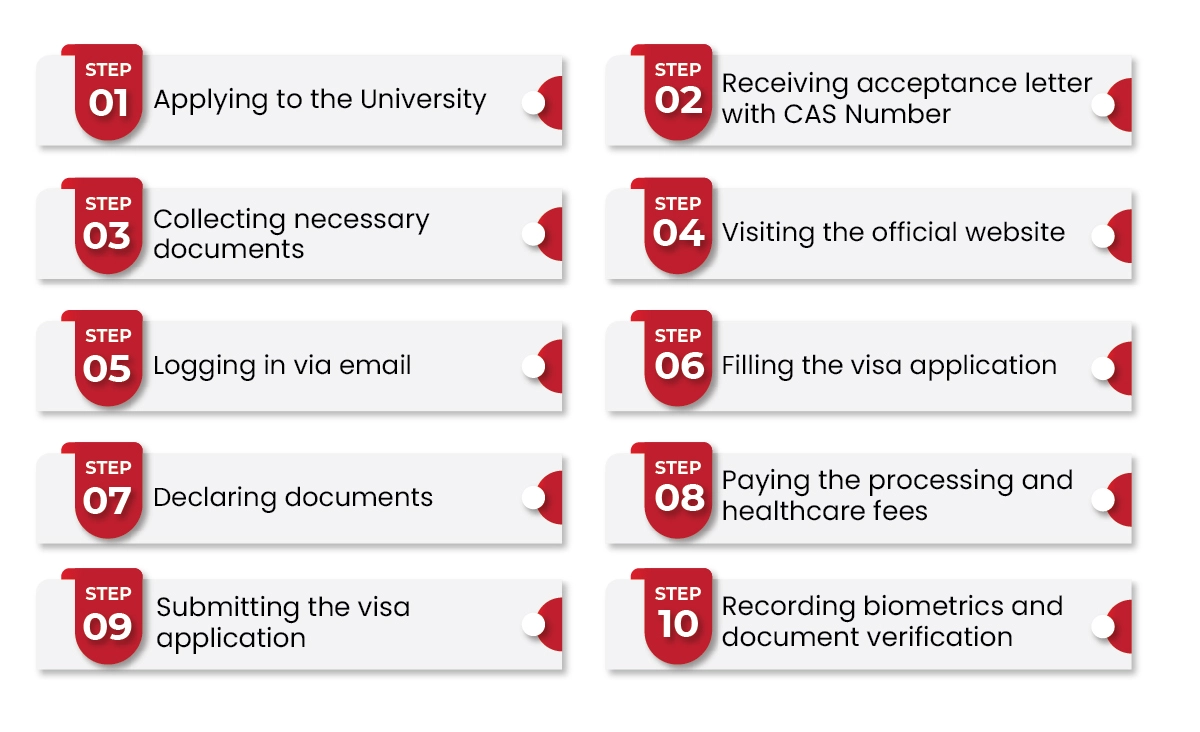
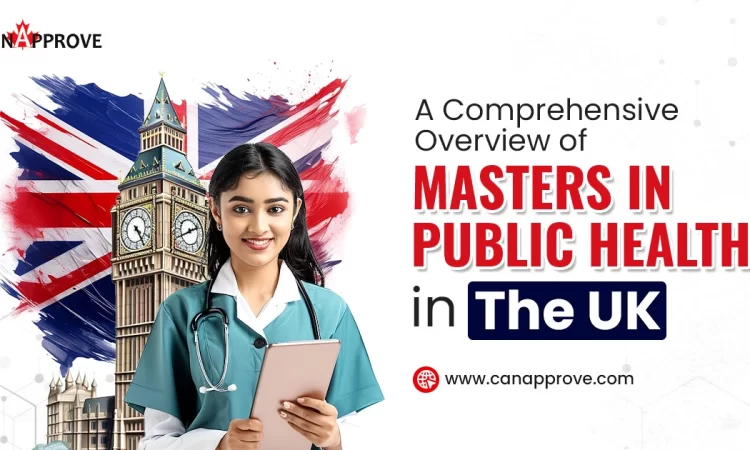
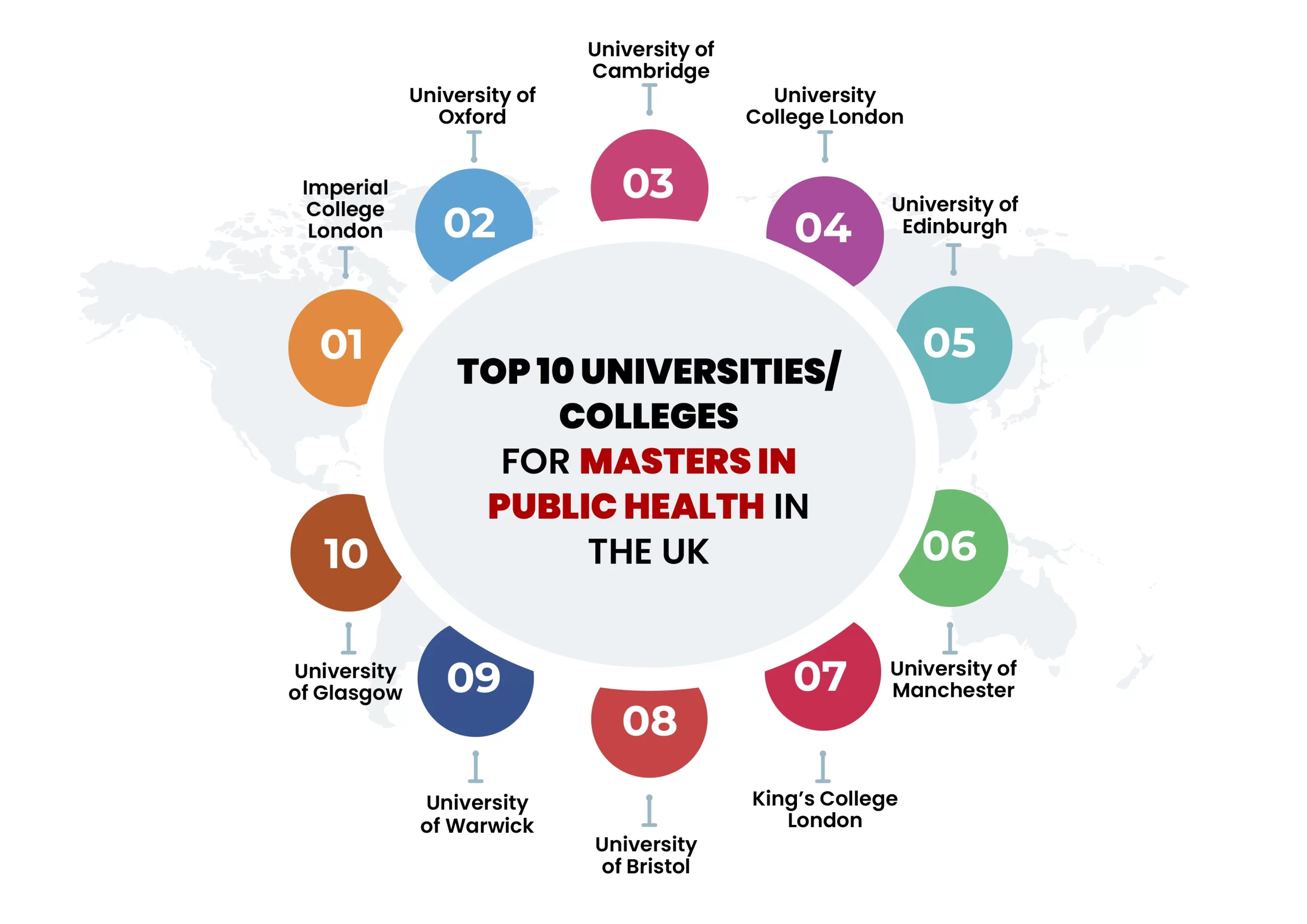

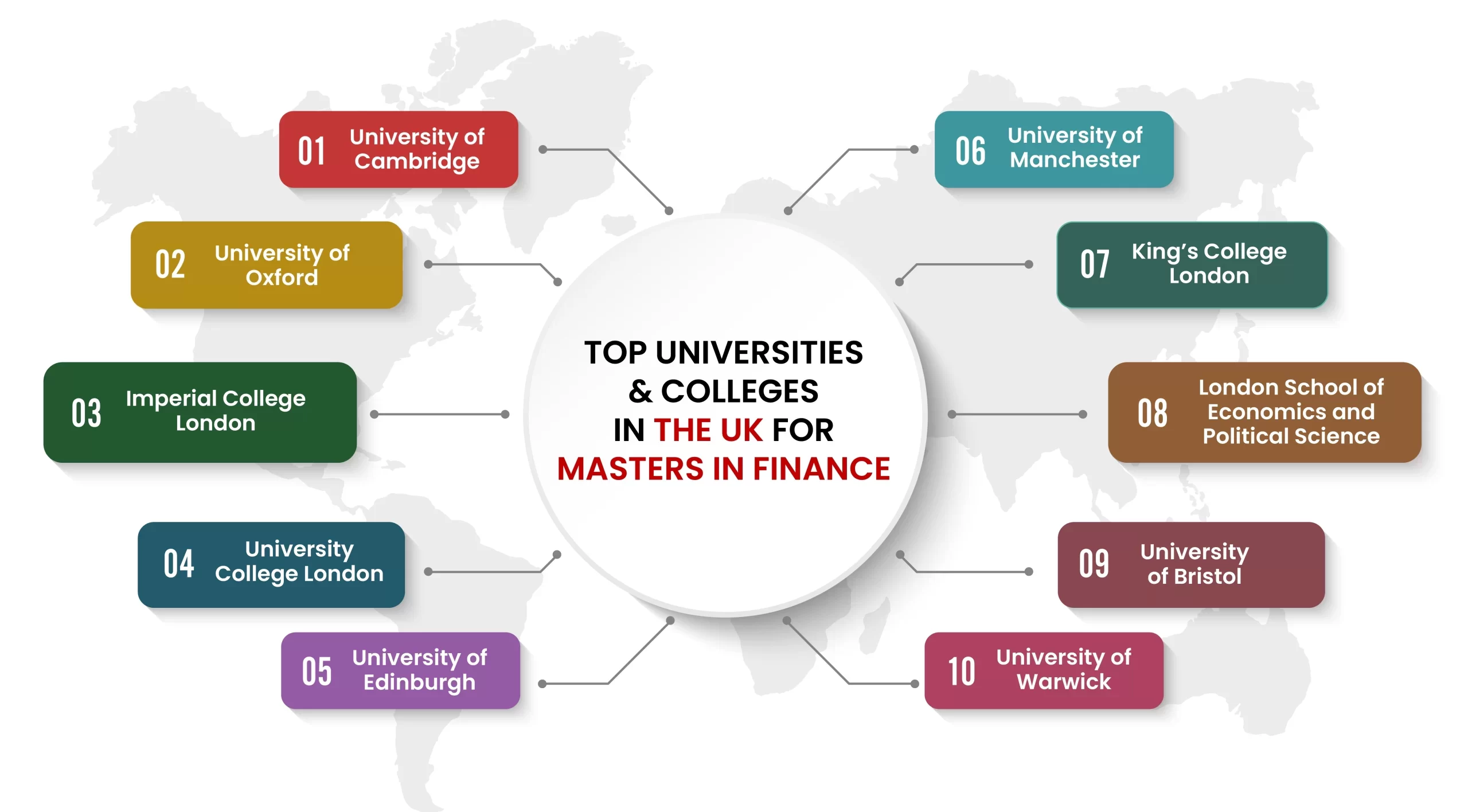






 Let’s look at the Permanent Residence pathways in the 4 best countries to study abroad!
Let’s look at the Permanent Residence pathways in the 4 best countries to study abroad!





